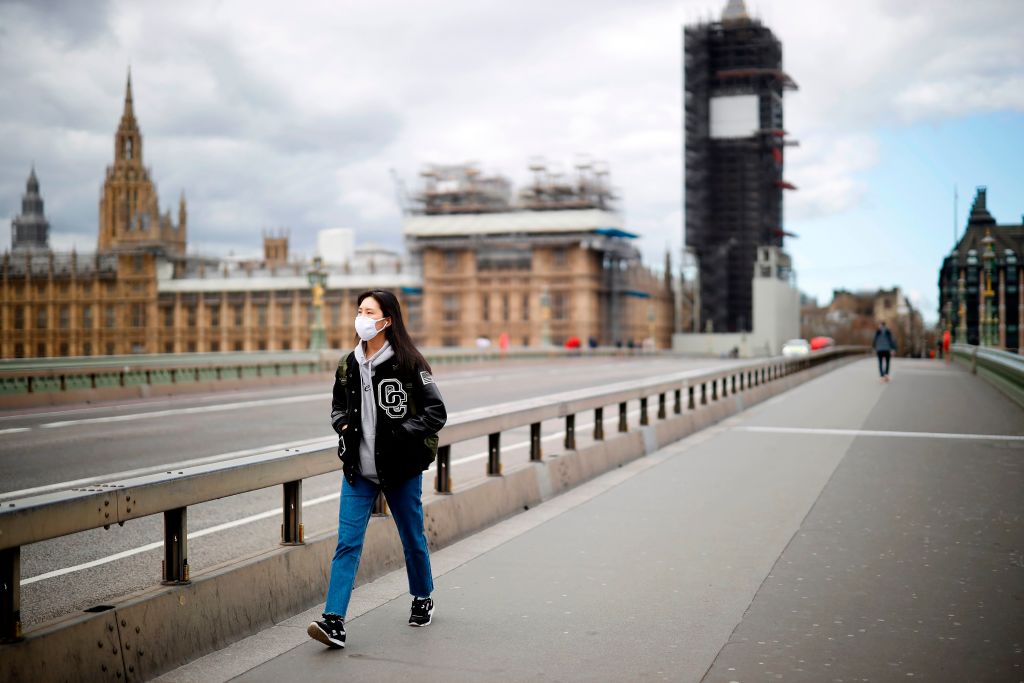The use of facemasks in the fight against coronavirus has become a contentious topic in recent weeks, as different countries have debated how much difference they make when worn by the general public.
After flirting with the idea of recommending the widespread use of masks, the WHO this week stuck with its guidance, which says that only healthcare workers, people who are sick and showing symptoms, and people caring for the potentially infected should wear masks.
The UK has taken a more hard-line approach. Since the beginning of the outbreak, it has said that even sick people showing symptoms shouldn’t wear masks at home, as they are most effective when used by healthcare workers and in hospitals.
The government says its stance is backed by the science. On Friday Matt Hancock, the Health Secretary, insisted that masks ‘are very important to protect healthcare workers… but [their use by the public] isn’t something that we’ve done here because we’ve followed the advice and we’ve followed the medical and scientific advice and the whole basis of our response has been making sure that we follow the science.’
But it appears that the UK’s own experts disagree. In February, one of the key bodies advising the government on its approach to tackling the pandemic, the New and Emerging Respiratory Virus Threats Advisory Group (known as NERVTAG), said that members of the public who are showing symptoms of the disease should wear Fluid Resistant Surgical Masks to prevent the disease spreading in their household.
According to official minutes of the meeting, the expert group said on 3 February that while there was little evidence to support healthy people wearing masks at home, there was some evidence to support those with symptoms wearing masks to prevent transmission. The group therefore recommended to the Department for Health and SAGE (the government’s Scientific Advisory Group for Emergencies) that those with symptoms should wear fluid resistant masks ‘if tolerated’.
NERVTAG is one of three expert groups advising the government on its coronavirus response, alongside disease modellers and behavioural experts. According to the government’s own website, NERVTAG is tasked with considering the scientific evidence, and then feeding in its consensus conclusions to SAGE.
If the expert consensus was ignored in this case, it does call into question the government’s claim that it is basing its decisions solely on the science. It also suggests that other considerations, such as limited stockpiles of PPE, may be affecting its decision making. In recent weeks there have been complaints from doctors, frontline NHS staff and care workers about the availability of PPE, although the government has insisted that it is providing the necessary protective equipment.
It is worth stressing that the impact of sick people wearing masks in the home is generally limited. Professor David Heymann, professor of infectious disease epidemiology at the London School of Hygiene and Tropical Medicine, says that masks are only one way of preventing transmission of the disease in the home, along with keeping meticulous hygiene and physical distancing. But, he says masks ‘are useful if someone is sick and coughing to catch droplets, if worn properly, and that can prevent transmission to others and should be used in conjunction with physical isolation in the household, if there are other family members who are at great risk, such as the elderly.’
A Department of Health and Social Care spokesperson said: ‘face masks play an important role in clinical settings, such as hospitals. However, for the majority of people in more general settings, there is little evidence of widespread benefit of using facemasks to prevent transmission.’
Ben Cowling, a professor of epidemiology at the University of Hong Kong, suggests there are two reasons the government may not have advised symptomatic people in the home to wear masks: concerns about supply limitations and the risk of ‘compensatory behaviours’ – where people are more likely to go out if they are wearing a mask and feel protected. Masks could also encourage people to mix in the home, when the current government advice is that people showing symptoms should self-isolate in their house and avoid family members where possible.
If people don’t have the ability to self-isolate in one room though, it’s unclear why the government doesn’t recommend that they should wear facemasks. This applies even more to those who live with elderly or vulnerable people. And, if the government is altering its advice on facemasks because of stockpiling concerns, rather than the medical evidence, it should be very careful about claiming that it is ‘following the science’.







Comments